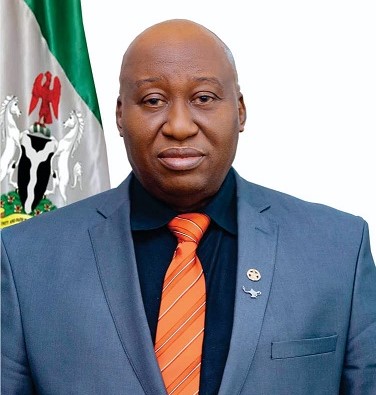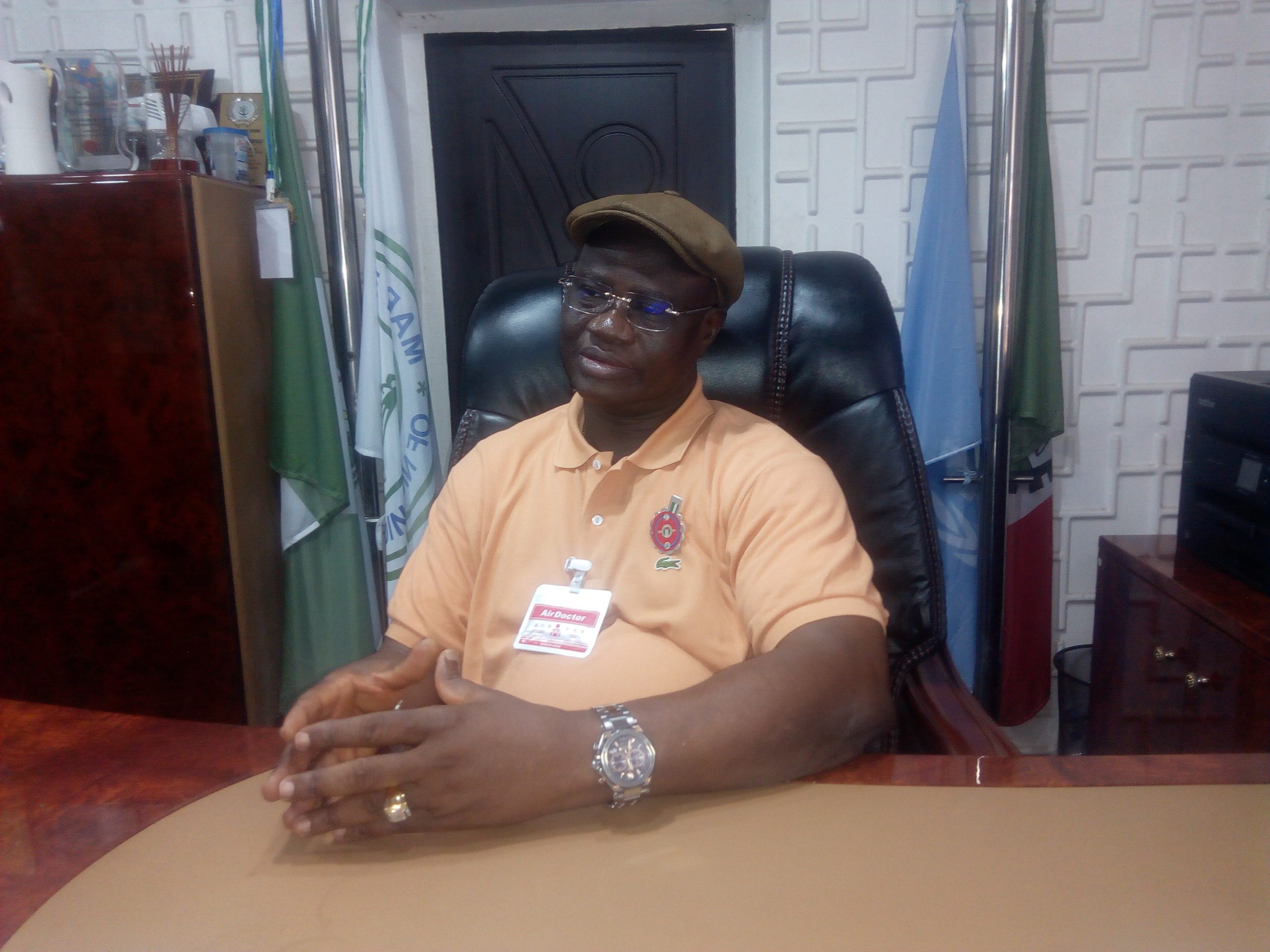The Maritime Academy of Nigeria, Oron Akwa Ibom State, has undoubtedly experienced remarkable re-engineering in terms of its physical structures, trainers, training equipment and in the general outlook since 2017, when a purposeful change began.
In this interview taken during the Academy’s recent training workshop for staff titled ‘Cascading Performance Management’, Rector of the Academy, Commodore Duja Effedua(Rtd.), disclosed that the Academy is very certain of its continued development- this time around, it is all about the workforce.
According to the Rector, the Academy’s focus has turned to ensuring continued capacity development for members of staff, application of modern approaches to reviewing staff effectiveness on the job and contributions to achieving set goals; for a workforce that would be enjoying regular training and periodic reviews on the job. Promotions to new levels would be earned; a further strategic way to making the best workforce for a reputable academy for maritime education.
Enjoy these and more in this discussion.
- Please note that the interview has been edited to reduce the volume of the material, but we have not lost the intended information meant for our reading public. Thank you.
What informed the need for this training workshop for staff?
It is quite simple. I am coming from a different background; in the Military, these are mandatory programmes you must go through at every level continuously. And the ultimate goal is attitudinal change and we have seen that it has improved efficiency.
In my younger days, I used to know that the Civil Service was a highly organised sector, plenty of discipline, you see it in them. They earned their respect, they were very meticulous, so organised. But over the years, that efficiency disappeared because other considerations were put first.
People have to be eminently qualified for the jobs they are given; when a HOD (Head of Department) talks you know he is speaking. If a Director is speaking you will know. If a Permanent Secretary is talking, you will know. But these days, apart from the ‘old school, those are now permanent secretaries and senior directors, they still have it, things have changed. The younger ones don’t have the kind of quality of trainings, so I noticed operational gaps; they were not as efficient as they should be. You expect people to be able to use their initiatives, but a number of them didn’t know what to do. You give a man a task and you come back to do that task yourself, because they didn’t seem to understand their responsibility. Therefore, you cannot be the boss if you give you a responsibility and end up coming to do the assignment yourself.
The Permanent Secretary was helpful with information about the consulting firm, which turned out very sound for the training. And it was great to also have some directors from the Ministry be a part of the workshop.
We plan to have a second phase, in order to accommodate those who missed out on this first training. Journalists who missed this would also be given the opportunity for the next phase as well. For the journalists, it would be rewarding to have the knowledge as the professionals. It would help your work; just like you see in CNN- their Defence correspondents are mostly Generals, Colonels, their medical and health correspondents are doctors, like Gupta, a doctor, and Fauci, who can talk about whatever health issue, because they have the knowledge and we have a lot to tap from them.
So, for now, we have infrastructure and training equipment, we have qualified lecturers also; you have been here and you have seen what we have here. Most people don’t even know the Academy has evolved; we have broken off the challenges of the past. We want to focus now on capacity-building. If a HOD is well adjusted for his job, you will see him coming out with fantastic ideas; he would know how to manage men.
On the issue of global quality meeting local demand, does this mean that at some point, we won’t even need for foreign training for human capital development like we have now?
You will always have foreign training, because things evolve. For instance, there are always new innovations, especially in the maritime industry. For instance, if there is something new, you must go and train for it before you acquire it, even pilots go for courses to become current; and divers too. So, for those in nautical engineering, something new might come up ; there have been new innovations since the past 20 years; New concepts will always come. For example, the Manila Convention, if not for covid, there would have been one in 2020, maybe the name of the town or the city that would host it would have been. But ideas that people have been working with in that gap of 10-15 years, they would say this worked for us, we did this and did that and subjected it to tests, so we think we should adopt it . People would talk about it, committee of experts, before you know it additional ideas come on and new laws too. So knowledge and new ideas keep evolving daily, monthly, annually and people come together for that purpose.
How do you want to ensure knowledge transfer to the junior staff and others who were not in attendance? How do you also intend measuring success?
OK, I have always been involved in training before coming here and the training is for all. So, the junior ones would have their turn by the next quarter and I want to make that happen latest by the first week of August, when another 100 people would be launched into the training. For those who have learned, mentorship is the order of the day. For my directors, we have been interacting for long and a lot of them have changed. Let them know what their responsibilities are, and every department has an SOP (Standard Operating) Procedure), and it would tell you your responsibility; just be honest with yourself that you left your home to come to work and at the end of the day you must have done one or two things. The Academy has changed totally. When I first came it was like a market place, people loitering everywhere. But that doesn’t happen anymore. For you to come in here you must have an invite, a reason. People now know their responsibility. Nobody stopped them, but because they don’t see me outside anyhow, I come to work and face my work, when I am tired I take a walk and go back and at the end of the day I go home. They understand that they have to work. And we have this evaluation report on everybody; promotion is no longer free for all like it was before. You must earn your promotion now. I was completely detached from the last promotion and the staff saw how transparent it was. It was conducted by the Ministry and I refused to see the results personally, until the Board presented it to all of us at the same time.
During the workshop, it was noted that APAR as a tool for measuring staff performance had become obsolete. Now, especially with monitoring of work and tracking staff performance, have you found it to be limiting?
I agree APAR is limiting and obsolete. And I have known that before now, so I don’t look at that. I challenge you as a person, with a specific task; for example, as you people were coming here, you were challenged to make sure that this workshop runs smoothly. It is a specific mandate, and if you use the SMART acronym for a guide, your problem is solved.
APAR is just a template, a piece of paper. There is nothing inside, except what you, the boss, think about the person you’re assessing. You can go outside the books if the person being reviewed is not reliable. For example, certain letters and queries do not reflect in the APAR, but they do in the person’s record and tarnish whatever opportunities they might have in the future. So, APAR is indeed obsolete and there is need for a review.
In a summary of the entire training and talking about the importance of SMART, how will you situate mentorship in achieving the new interests of reviewing staff performance?
Mentorship appears to be something that people think there is a textbook approach to. For example, a child who grows up in a house where both parents smoke would probably end up smoking. A child, whose father beats up his mother, would end up beating up his wife in future, because he thinks it is normal. So, mentorship, in the office, if you know that your boss doesn’t go out and he is very thorough and he gets angry with you for not doing your duties properly, nobody would tell you to make a change.
So, mentorship is something people should take delight in. Here, when I came, the top management were the only ones attending training programmes, but I insisted that the lower levels be included as well.


































































